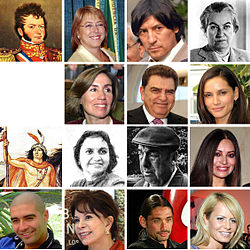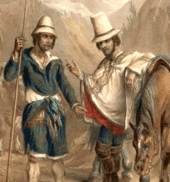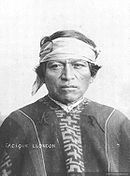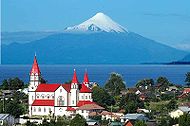- Chilean people
-
This article is about the Chilean ethnic group. For information on the population of Chile, see Demographics of Chile. For Chilean nationality, see Chilean nationality law.
Chileans
Chilenos Bernardo O'Higgins • Michelle Bachelet • Iván Zamorano • Gabriela Mistral • Víctor Jara • Gladys Marín • Mario Kreutzberger • Leonor Varela • Lautaro • Violeta Parra • Pablo Neruda • Myriam Hernández • DJ Méndez • Isabel Allende • Marcelo Ríos • Cecilia Bolocco
Bernardo O'Higgins • Michelle Bachelet • Iván Zamorano • Gabriela Mistral • Víctor Jara • Gladys Marín • Mario Kreutzberger • Leonor Varela • Lautaro • Violeta Parra • Pablo Neruda • Myriam Hernández • DJ Méndez • Isabel Allende • Marcelo Ríos • Cecilia BoloccoTotal population ~18 million Regions with significant populations  Chile 17,094,275[1]
Chile 17,094,275[1] Argentina
Argentina429,708[2]  United States
United States113,934[2]  Sweden
Sweden42,396[2]  Canada
Canada37,577[2]  Australia
Australia33,626[2]  Brazil
Brazil28,371[2]  Venezuela
Venezuela27,106[2]  Spain
Spain23,911[2]  France
France15,782[2]  Germany
Germany10,280[2] Other countries 95,090[2] Languages Religion Catholicism, Evangelical Protestantism minorities of other religions.
Related ethnic groups Spaniards, Mapuche, Other European peoples, Other Amerindian peoples.
Chilean people, or simply Chileans, are the native citizens and long-term immigrants of Chile. Chileans are mainly of Spanish and Amerindian descent,[3] with small but significant traces of 19th and 20th century European immigrant origin. A strong correlation exists between the ancestry — or ethnicity — and socioeconomic situation of Chileans, with notable differences observed between the lower classes of high Amerindian ancestry and the upper classes of mainly European ancestry.[4][5]
Post-independence immigrants have never comprised more than two percent of the total population, though their descendants are now hundreds of thousands, including Chileans of German,[6] British, French, Croatian, Italian or Palestinian[7] descent. Though majority of Chileans reside in Chile, significant communities have been established in multiple countries, most noticeably Argentina[8] and the United States.[9] Other large Chilean communities are in Australia, Canada, France and Sweden. Although small in number Chilean people make up a substantial part of the permanent population of Antarctica and the Falkland Islands.[10]
Contents
Ethnic structure
Chile is a multiethnic society,[11] which means that it is home to people of many different ethnic backgrounds. The following studies on the ethnic structure of Chile are non-conclusive, and therefore might vary significantly from one another.
UNAM professor of Latin American studies, Francisco Lizcano, estimates that a predominant 52.7% of the Chilean population is of European origin, with an estimated 44% of Mestizo descent.[12] Other sources put the total amount of Caucasians at over 60 percent.[13] Concurrently, a public health book from the University of Chile states that 30% of the population is of Caucasian origin; predominatly-White Mestizos are estimated to amount a total of 65%, while Amerindians comprise the remaining 5%.[14]
Another study by the University of Chile found that the average Chilean's genes are 64% Caucasian and 35% Amerindian.[15] Some publications, such as the CIA World Factbook, state that the entire population consist of a combined 95.4% of Caucasians and mestizos, and 4.6% of Amerindians. These figures are based on a national census held in 2002, which classified the population as indigenous and non-indigenous, rather than as white or Mestizo.[16]
Other genetic studies have found that in Chile's capital Santiago, about 84% of mitochondrial DNA is of Amerindian origin, while the European contribution in the Y chromosome is about 70%,[17] and between 6% to 15% Native American, depending on the area of the city.[18]
Native American and European genetic contribution can vary by socioeconomic stratum. Amerindian genetic contribution is 27% in the high-income groups, 32% in the middle-income groups and 52% in low-income groups,[19] while European admixture in cities such as Santiago varies between 41% in low socioeconomic levels to 91% in high socioeconomic levels.[15]
Chileans view themselves as a majority white population. The 2011 Latinobarómetro survey asked respondents in Chile what race they considered themselves to belong to. Most answered "white" (59%), while 25% said "mestizo" and 8% self-classified as "indigenous".[20]
Ethnographic history of Chile
Spaniards, mestizos and indians
 Rural population in the nineteenth century by Claudio Gay.
Rural population in the nineteenth century by Claudio Gay.
For at least 12,000 years, numerous indigenous peoples settled in central and southern Chile. The predominant Mapuche inhabited these areas up until the Spanish conquest. During the colonial period, troops were sent out to the Americas by the Spanish Crown in order to protect distant colonies. Spanish folk immigrated from all regions of Spain, particularly Andalusia, Extremadura, Basque Country, Asturias, Navarra and Castile. Of the Spanish, many immigrants ultimately settled in Chile after the Mapuche resistance to the conquest.
The government of Agustín de Jáuregui, which ruled around 1777–1778, ordered the first general population census. The census confirmed a total of 259,646 inhabitants at the time, with 73.5% classified as Caucasian (white), 7.9% as Mestizo, 8.6% as Indian, and 9.8% as African (black). In 1784, Francisco Hurtado, governor of the province of Chiloé, conducted a population census in Chiloe that totaled 26,703 inhabitants, of which about 64.4% was classified as españoles ("Spaniards", Caucasian and Mestizo people) and 33.5% considered indios ("Indians").
In 1812, the Diocese of Concepción conducted a census to the south of the Maule river; however, this did not include the indigenous population — at that time estimated at 8,000 people — nor the inhabitants of the province of Chiloé. In Chiloé, estimates put the total population at 210,567, of which 86.1% was native Spaniards and 10% were Indian, with a remaining 3.7% of Africans, mulattos, and mestizo descent.[21] Other estimates in the late 17th century indicate that the population reached a maximum total of 152,000, consisting of 72% whites and mestizos, 18% Indians, and 10% blacks and mulattos.[22]
For many years, Spanish-descent settlers and religious orders imported African slaves to the country, which in the early 19th century constituted 1.5% of the national population.[23] Despite this, the Afro-Chilean population was negligible, reaching a height of only 2,500 — or 0.1% of the total population — during the colonial period.[24]
In the 18th century, many Spanish civilians (mainly of Basque origin) entered the country, in particular attracted by trade liberalization at the time enacted by the Spanish Crown. In the late 18th century, Basque descendants were estimated to comprise 27% of the total population.[25] Most of the Basque immigrants initially partook in small businesses, though others attained higher levels of prosperity. Of those, many mixed with the Criollo aristocracy of Castilian origin, who owned much of the land. This resulted in the Castilian-Basque aristocracy, which later came to form the basis of the Chilean ruling class. Estimates of the number of descendants from Basques in Chile range from 10% (1,600,000) to as high as 27% (4,500,000).[26][27][28] [29][30][31][32][33]
Incorporation of new elements after independence
Main articles: Immigration to Chile and Occupation of AraucaníaFollowing Chile's independence there were successive waves of Spanish, Italians, Irish, French, Greeks, Germans, British, Dutch, Croats, Russians, Poles, Hungarians, Portuguese and Middle Eastern immigrants.
In 1848 an important and substantial German immigration took place, laying the foundation for the German-Chilean community. Sponsored by the Chilean government for the colonization of the southern region, the Germans (including German-speaking Swiss, Silesians, Alsatians and Austrians), strongly influenced the cultural and racial composition of the southern provinces of Chile. The German Embassy in Chile estimated 500.000 to 600.000 Chileans are of German origin.[34]
It is estimated that nearly 5% of the Chilean population is of Asian origins, chiefly of the Middle East (i.e. Palestinians, Syrians, Lebanese and Middle East Armenians), are around 800,000.[35] Note that Israelis, both Jewish and non-Jewish citizens of the nation of Israel may be included. Chile is home to a large population of immigrants, mostly Christian, from the Levant. Roughly 500,000 Palestinian descendants are believed to reside in Chile.[36][37][38][39][40]
Other historically significant immigrant groups include: Croatians, whose numbers today are estimated at 380,000 persons, the equivalent of 2.4% of the population.[41][42] Other authors claim, on the other hand, that close to 4.6% of the Chilean population must have some Croatian ancestry.[43] Over 700,000 Chileans may have British (English, Scottish and Welsh) origin. 4.5% of Chile's population.[44]
Chileans of Greek origin are estimated 90,000 to 120,000.[45] Most of them live either in the Santiago area or in the Antofagasta area, and Chile is one of the 5 countries with the most Greeks in the world.[46] The numbers of Swiss add 90,000[47] and it is estimated that about 5% of the Chilean population has some French ancestry.[48] 600,000 to 800,000 are Italians. Other groups of European descendants have followed, but are found in smaller numbers. They did transform the country culturally, economically and politically. European emigration in Chile and to a lesser extent, the arrival from Middle East, produced during the second half of the nineteenth and 20th centuries, was the most important in Latin America[49][50] after that occurred in the Atlantic Coast of the Southern Cone (i.e., Argentina and southern Brazil).[51]
Additionally, some of the different ethnic groups in Europe intermarried therefore diluting the distinct cultures, descent and identities of the home countries and fusing them together with each other as well as with that of the original Basque-Castilian aristocracy of the colonial period while at the same time preserving elements of them, to form the society and culture of the Chilean middle and upper classes.[27] Therefore they enjoy elements of the original European cultures, such as the British afternoon tea and biscuits, French casseroles and coffee, German cakes and sausage, and Italian pasta and mineral waters. This can be clearly in the architecture of the cities. They also look down on Chilean folk culture, as it is an offshoot of the culture of the Spaniards who settled the country in the colonial period.
Indigenous Chileans
Main articles: Mapuche and Indigenous peoples in Chile Depiction of a Mapuche man.
Depiction of a Mapuche man.
Although indienous peoples like Mapuches and Aymaras are in some situations contrasted against Chilean people the two demonyms are not mutually exclusive and are rather often used combined, for example: "a Chilean Aymara".
The 1907 census reported 101,118 Indians, or 3.1% of the total country population. Only those that practiced their native culture or spoke their native language were considered, irrespective of their "racial purity."[52]
At the 2002 census, people that declared themselves as indigenous amounted to 4.6% of the population (692,192 people); of these, 87.3% declared themselves Mapuche.[53] although most show varying degrees of mixed ancestry.
Some native peoples of Chile disappeared product from acculturation and miscegenation, as is the case of peoples Picunches, Diaguitas and Chonos, whereas a large number of Selknam or Onas disappeared by the extermination carried out by settlers in Tierra del Fuego in the early 20th century. Other factors that contributed to their extinction were diseases brought by white men, such as the smallpox.
Religions
Main article: Religion in ChileReligion % Catholic 70.0% Protestant or evangelical 15.1% Jehovah's Witnesses 1.0% LDS Church 0.9% Jewish 0.4% Atheist or Agnostic 8.3% Others 4.2% Culture
Main article: Chilean Culture Chilean rodeo, is unique to Chile and is one of the most popular sports in the country
Chilean rodeo, is unique to Chile and is one of the most popular sports in the country
The folk culture of Chile has mostly Spanish origins, especially the huaso culture of the central part of the country, as it arose in the colonial period due to cattle ranching. It could therefore be considered an offshoot of Spanish popular culture of the 17th an 18th centuries as are the folk cultures of the rest of Latin America and also, its direct descendents, Andalusian and Castilian folk cultures. The Andalusian forms in the huaso dress is apparent to Europeans and the music and dances show Spanish origins, even though both have been adapted and are distinct from dress, music and dance in Spain today.
The ranches called fundos, where the huasos lived and worked show strong similarity with Spanish vernacular architecture, especially in the canal roofs and the interior courtyards. The fundo is now thought of as traditional Chilean architecture and is associated with the huaso.
As well as the huaso culture of the central part of the country can be seen the German, Chilote, Croatian and Magallanic culture in the south, and the Andean culture in the north.
Chile's Nueva Canción movement in modern Chilean folk culture is adapted from the folk music of the north, not of the brass bands but of the panpipes and quenas. The traditional Chilean folk music of the huasos were also popularised, particularly the tonadas, folk songs sung with a guitar, mainly on the topics of love. Several folk groups who dress in huaso costume became famous nationwide.
The folk culture that is mainly associated with the Chilean national identity is that of the huasos as that is where the Chilean state was form and it spread northwards and southwards in the late 19th century.
Emigration of Chileans
Emigration of Chileans has decreased during the last decade: It is estimated that 857,781 Chileans live abroad, 50.1% of those being in Argentina (the highest number), 13.3% in the United States, 8.8% in Brazil, 4.9% in Sweden, and around 2% in Australia, with the rest being scattered in smaller numbers across the globe. Other Chilean refugees settled (not ranked by order of size) in Spain, Mexico, Costa Rica, United Kingdom, Canada, France, Germany and Italy.
Many pro-Allende refugees in the 1970s fled to East Germany, including former president Michelle Bachelet had also lived in Australia.[54] While anti-Pinochet refugees formed a large expatriate community in Europe and a smaller community in North America (the US and Canada).
Over 100,000 Chileans fleeing from both regimes in the 1970s and 1980s settled in the US, a small number compared to other Latino groups. The highest number settled in Miami, Florida, but smaller enclaves are in Washington, D.C.; New York City; and California (the Los Angeles area - Beverly Hills and Long Beach); and San Francisco (San Mateo County).
Approximately 2,500 Chilean exiles fled to the UK in the early 1970s and by most recent estimates the Chilean British population is in its tens of thousands, and represents a significant proportion of the UK's one million strong Latin American community. By far the largest concentration of Chileans can be found in London with significant other communities being Birmingham, Sheffield and the Manchester–Liverpool Metropolitan area.[55]
Historic emigration took place in the early 19th century when Chilean ranchers went to Mexico after their independence. Thousands of miners from Chile went to California, the U.S. during the 1850s California Gold Rush, as well in other gold rushes in Colorado (1870s) and the Yukon (1890s). Small numbers of Chilean miners also migrated to South Africa and Australia for the same reason.[56][57]
See also
- Anti-Chilean sentiment
- Chilean American
- Chilean Australian
- Chilean Brazilian
- Chilean British
- Chilean Greek
- Chilean Spanish
- Chilean Swedes
- Latin Americans
References
- ^ "Instituto Nacional de Estadística (2007). Compendio estadístico de Chile 2006" (PDF). http://www.ine.cl/canales/publicaciones/compendio_estadistico/pdf/2006/compendio2006.pdf. Retrieved 2011-09-22.
- ^ a b c d e f g h i j k "Registro de Chilenos en el Exterior 2003-2004". Chilesomostodos.gov.cl. 2008-06-17. http://www.chilesomostodos.gov.cl/descargas/cat_view/50-registro-de-chilenos.html. Retrieved 2011-09-22.
- ^ Valenzuela, C. and Harb Z. 1977.Socioeconomic Assortive Mating in Santiago, Chile: A Demonstration Using Stochaistic Matrices of Mother-Child Relationships Applied to ABO Blood Groups Departamento de Biología Celular y Genética, Facultad de Medicina, Universidad de Chile, Santiago, Chile.
Quote: The Chilean population steams mainly from the admixture of Spanish people with Chilean aborigines - ^ Vanegas, J., Villalón, M., Valenzuela, C. Consideraciones acerca del uso de la variable etnia/raza en investigación epidemiológica para la Salud Pública: A propósito de investigaciones en inequidades Revista Médica de Chile 2008; 136: 637-644.
Quote translated from Spanish: ..in Chile the [racial] process is vinculated to a socioeconomic stratification; the Spaniards of the upper class that did not mix, the mix of European Spaniards and mestizo women in the middle strata, in the lowest substrate the mestizo-mestizo and mestizo-amerindians. - ^ Valenzuela, C. El Gradiente Sociogenético Chileno y sus Implicaciones Etico-Sociales, Facultad de Medicina, Universidad de Chile
Quote: Al analizar la composición étnica por estratos sociales nos hemos encontrado con un gradiente sociogenético importante que condiciona la estructura de la morbimortalidad según estrato socioeconómico y la evolución sociocultural de Chile - ^ German Embassy in Chile.
Quote in German: Es wird geschätzt, dass zwischen 500 bis 600 Tausend Chilenen deutscher Herkunft sind. - ^ "Los palestinos miran con esperanza su futuro en Chile sin olvidar Gaza e Irak", El Economista, 2009-02-11, http://ecodiario.eleconomista.es/sociedad/noticias/1028142/02/09/Los-palestinos-miran-con-esperanza-su-futuro-en-Chile-sin-olvidar-Gaza-e-Irak.html, retrieved 2009-07-29
- ^ "Colectividad chilena, Bajaron de los barcos, ONI". Oni.escuelas.edu.ar. http://www.oni.escuelas.edu.ar/olimpi98/BajarondelosBarcos/Colectividades/Chile/Colectividad%20Chilena.htm. Retrieved 2011-09-22.
- ^ "Top 101 cities with the most residents born in Chile (population 500+)". city-data.com. http://www.city-data.com/top2/h154.html. Retrieved 2010-01-04.
- ^ "Chilenos son atraídos por la bonanza de las islas Malvinas". El Mercurio. 2007-03-30. http://diario.elmercurio.com/detalle/index.asp?id=%7Bf817b646-c4b6-4a69-a9fb-616286ad6199%7D. Retrieved 2011-09-22.
- ^ "La riqueza de los chilenos está en su gran diversidad genética". El Mercurio. 2010-09-12. http://www.mer.cl/modulos/catalogo/print_noticia.asp?idnoticia=C49415020100912&fecha=2010-09-12. Retrieved 2011-09-22.
- ^ Composición Étnica de las Tres Áreas Culturales del Continente Americano al Comienzo del Siglo XXI. http://books.google.cl/books?id=LcabJ98-t1wC&pg=PA93.
- ^ Esteva-Fabregat (1988). "El mestizaje en lberoamérica". "a white majority that would exceed 60% of the Chilean population"
- ^ "5.2.6. Estructura racial". La Universidad de Chile. http://mazinger.sisib.uchile.cl/repositorio/lb/ciencias_quimicas_y_farmaceuticas/medinae/cap2/5b6.html. Retrieved 2007-08-26. (Main page)
- ^ a b "Genetic epidemiology of single gene defects in Chile". ncbi.nlm.nih.gov. http://www.ncbi.nlm.nih.gov/pmc/articles/PMC1050080/pdf/jmedgene00288-0042.pdf. Retrieved 2011-11-05.
- ^ "CIA World Factbook: Chile". Cia.gov. https://www.cia.gov/library/publications/the-world-factbook/geos/ci.html. Retrieved 2011-09-22.
- ^ "Ultima Hora : Genética Chilena y Poblamiento de América". Aforteanosla.com.ar. http://www.aforteanosla.com.ar/afla/imagenes%20uh/hoja26/genetica%20chilena.htm. Retrieved 2011-09-22.
- ^ Fernando Donoso (September-October 2011). "El ADN de los chilenos". Revista Enfoque. http://page.issuu.com/110921030824-32dd1250769046e0868f9de407be3bb8/swf/page_36.swf.
- ^ http://www.elciudadano.cl/2010/09/16/seminario-“origen-y-composicion-genetica-de-los-chilenos”-explica-desarrollo-biologico-y-cultural-de-nuestra-poblacion/
- ^ Informe Latinobarómetro 2011, Latinobarómetro.
- ^ "INE - Censo de 1813. Introducción" (PDF). http://www.ine.cl/canales/usuarios/cedoc_online/censos/pdf/censo_1813.pdf. Retrieved 2011-09-22.
- ^ Icarito - La Colonia:Población y sociedad
- ^ [Rolando Mellafe (1959): "La introducción de la esclavitud negra en Chile. Tráfico y rutas", Universidad de Chile (Departamento Historia Instituto Pedagógico). Santiago]
- ^ "Elementos de Salud Pública, section 5.2.6". University of Chile. http://mazinger.sisib.uchile.cl/repositorio/lb/ciencias_quimicas_y_farmaceuticas/medinae/.
- ^ vascos Ainara Madariaga: Autora del estudio "Imaginarios vascos".
- ^ Mikel Soro/ (1997-12-01). "Diariovasco". Diariovasco.. http://www.diariovasco.com/pg060724/prensa/noticias/AlDia/200607/24/DVA-ALD-003.html. Retrieved 2011-09-22.
- ^ a b "entrevista al Presidente de la Cámara vasca". Deia.com. 2008-05-22. http://www.deia.com/es/impresa/2008/05/22/bizkaia/ekonomia/469496.php. Retrieved 2011-09-22.
- ^ vascos Ainara Madariaga: Autora del estudio "Imaginarios vascos desde Chile La construcción de imaginarios vascos en Chile durante el siglo XX".
- ^ "Basques au Chili". Euskonews.com. http://www.euskonews.com/0072zbk/gaia7204es.html. Retrieved 2011-09-22.
- ^ Contacto Interlingüístico e intercultural en el mundo hispano.instituto valenciano de lenguas y culturas. Universitat de València Cita: " Un 20% de la población chilena tiene su origen en el País Vasco".
- ^ (Spanish) La población chilena con ascendencia vasca bordea entre el 15% y el 20% del total, por lo que es uno de los países con mayor presencia de emigrantes venidos de Euskadi.
- ^ El 27% de los chilenos son descendientes de emigrantes vascos. DE LOS VASCOS, OÑATI Y LOS ELORZA Waldo Ayarza Elorza.
- ^ (Spanish) Presencia vasca en Chile.
- ^ German Embassy in Chile.[dead link]
- ^ (Spanish) En Chile viven unas 700.000 personas de origen árabe y de ellas 500.000 son descendientes de emigrantes palestinos que llegaron a comienzos del siglo pasado y que constituyen la comunidad de ese origen más grande fuera del mundo árabe.
- ^ "Chile: Palestinian refugees arrive to warm welcome". Adnkronos.com. 2003-04-07. http://www.adnkronos.com/AKI/English/CultureAndMedia/?id=1.0.2050534508. Retrieved 2011-09-22.
- ^ (Spanish) 500,000 descendientes de primera y segunda generación de palestinos en Chile.
- ^ (Spanish) Santiago de Chile es un modelo de convivencia palestino-judía.
- ^ Exiling Palestinians to Chile.
- ^ (Spanish) Chile tiene la comunidad palestina más grande fuera del mundo árabe, unos 500.000 descendientes.
- ^ (Spanish) Diaspora Croata..
- ^ "Splitski osnovnoškolci rođeni u Čileu". Matis.hr. 2009-03-25. http://www.matis.hr/vijesti.php?id=2265. Retrieved 2011-09-22.
- ^ "hrvatski". Hrvatski.cl. http://www.hrvatski.cl/html/croatas.htm. Retrieved 2011-09-22.
- ^ "Historia de Chile, Británicos y Anglosajones en Chile durante el siglo XIX". http://www.biografiadechile.cl/detalle.php?IdContenido=1673&IdCategoria=91&IdArea=488&TituloPagina=Historia%20de%20Chile. Retrieved 2009-04-26.
- ^ (Spanish) Embajada de Grecia en Chile.
- ^ (Spanish) Griegos de Chile
- ^ 90,000 descendants Swiss in Chile.
- ^ (Spanish) 5% de los chilenos tiene origen frances.
- ^ "Juan Bialet Massé en su informe sobre "El estado de las clases obreras en el interior del país"". Oni.escuelas.edu.ar. http://www.oni.escuelas.edu.ar/olimpi98/fronterasculturales/datos/cap-pop.html. Retrieved 2011-09-22.
- ^ SOCIAL IDENTITY Marta Fierro Social Psychologist.
- ^ Etnicidad y ciudadanía en América Latina.
- ^ 1907 census
- ^ "Censo 2002 - Síntesis de Resultados". Instituto Nacional de Estadísticas. http://www.ine.cl/cd2002/sintesiscensal.pdf.
- ^ Bachelet is first female Chilean leader New Age (Online Newspaper)
- ^ Diversity news page
- ^ Chilean Americans
- ^ Origins: History of immigration from Chile - Immigration Museum, Melbourne Australia
Ethnic groups in Chile Indigenous peoples AraucanianOthersImmigration EuropeanOthersAfrican · Arab (Lebanese · Palestinian · Syrian) · Chinese · Indian · Japanese · Jewish · Korean · Taiwanese · Americans & CanadiansCategory:Ethnic groups in ChileCategories:- Ethnic groups in Chile
- South American people
Wikimedia Foundation. 2010.

